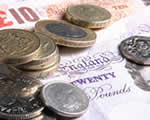 Go to main content
Go to main content
Archive Website of the UK government
Please note that this website has a UK government accesskeys system.
Main menu
Page menu
Money, tax and benefits

Overdrafts and loans - the difference

Overdrafts can offer flexible borrowing to meet short-term needs. Personal loans are for fixed amounts and are more suitable for borrowing larger sums over a longer term. If you're considering borrowing, be sure you can afford the repayments.
Overdrafts
Overdrafts are like a 'safety net' on your current account; they allow you to borrow up to a certain limit when there's no money in your account and can be useful to cover short term cashflow problems.
Some bank accounts have a free overdraft built in. If yours doesn't, you'll have to ask your bank for an authorised overdraft facility. Their decision will be based on your bank record and you may have to pay a fee to set it up. You don't have to use an authorised overdraft, but it's there if you need it and you won't pay extra charges for accidentally going overdrawn.
You have to pay back your overdraft plus interest. Rates differ between banks and can be fixed or variable. There may also be an arrangement fee and monthly charges.
Unauthorised overdrafts
If you go overdrawn without your banks authorisation, the charges are likely to be high. Your bank may also bounce (refuse to pay) cheques you write or refuse to pay direct debits and charge fees for each refused transaction. They may also charge additional administration fees.
Personal loans
With a personal loan you borrow an agreed sum and pay it back with interest over a certain length of time (usually one to five years). Interest rates can be fixed or variable. You normally have to stick to a payment schedule. Personal loans can be handy for covering large expenses like buying a car or equipment.
An 'unsecured' loan means the lender relies on your promise to pay it back. They're taking a bigger risk than with a 'secured' loan, where they can take whatever you've secured the loan against (like property) if you don't repay it. So interest rates for unsecured loans tend to be higher.
What does APR mean?
APR stands for annual percentage rate. It shows you the actual cost of the loan, as a yearly interest rate. It includes charges and fees as well as interest to help you compare loans on equal terms.
Pros and cons of personal loans
Pros:
- you can generally borrow larger amounts than with an overdraft
- you're free to shop around - you don't need a bank account
- interest rates and charges are normally lower than for an overdraft
- you know exactly when the loan will be paid off
Cons:
- loans are less flexible than overdrafts
- there may be penalties for paying a loan off early
- you can't normally miss a repayment
Points to watch out for
- don't be persuaded to borrow more than you need or can afford
- if the interest rate's variable, make sure you budget for possible increases
- some lenders press you to buy insurance to cover the repayments if you get ill or lose your job
Shopping around for loans
There's a wide choice of loans available, so shop around for the best deal. Compare interest rates, APR, terms (like charges and penalties for paying the loan off early) and how long you can borrow for. You can use the Money Advice Service's online calculator to work out typical monthly repayments.
Can you afford to borrow?
Whether borrowing through an overdraft or a loan, be sure you can afford the repayments. If you can't, your debts can quickly spiral out of control.
It may be that you don’t have a bank account, have a bad credit history (or no credit history at all) and feel that you won’t be able to get the normal low cost credit available from banks or building societies.
The table below provides details of various lenders and their typical rates, showing the savings you could make:
| Lender/Rates | Illegal lender | High cost credit provider | Doorstep lender | Credit Union |
|---|---|---|---|---|
| Amount of loan | £300 | £300 | £300 | £300 |
| Typical APR | 1000% | 246.50% | 117% | 26.8% |
| Terms of loan (weeks) | 52 | 52 | 55 | 52 |
| Weekly repayment | £55.50 | £17 | £9 | £6.55 |
| Total repayable | £3000.32 | £884 | £495 | £340.44 |
| Total interest | £2700.32 | £495 | £195 | £40.44 |
Follow the link below to find a Credit Union near you or by looking in the Yellow Pages under 'Credit Unions'.
More useful links
Useful contacts
Additional links
Foreign-owned banks

Should a bank fail, compensation schemes protect your savings. But foreign-owned banks may be covered in other ways
 Facebook
Facebook Twitter
Twitter StumbleUpon
StumbleUpon Delicious
Delicious Reddit
Reddit
